|
|
|
Sort Order |
|
|
|
Items / Page
|
|
|
|
|
|
|
| Srl | Item |
| 1 |
ID:
093237
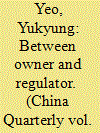

|
|
|
|
|
| Publication |
2009.
|
| Summary/Abstract |
This study explains the institutional structure and mechanism of economic regulation in China's telecommunications basic service industry. The case of telecoms basic service provides an excellent window to explore how Chinese leadership governs strategic state sectors whose assets and profits are central to the national economy. Challenging the ideational model of independent regulator, this study argues that the State-owned Assets Supervision and Administration Commission (SASAC) explains much of the telecoms business regulation, as the authority of the Ministry of Information Industry has been circumscribed by other party-state institutions. The SASAC's regulatory power suggests that the primary goal of the Chinese industrial economy is the best protection of state assets through the creation of large and strong state firms, not the protection of consumers' interests by breaking up the monopoly in markets.
|
|
|
|
|
|
|
|
|
|
|
|
|
|
|
|
| 2 |
ID:
140640
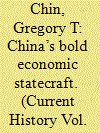

|
|
|
|
|
| Summary/Abstract |
China’s global profile is changing dramatically. An active member of the United Nations and the Bretton Woods organizations (the International Monetary Fund and the World Bank) since the mid-1970s, Beijing is now building new multilateral financial institutions where it sits at the center of the table, making rules and setting standards. After the two decades from the 1980s to the early 2000s, when it aspired mainly to integrate into the existing international economic institutions, China has transformed into an increasingly confident global actor, keen to capitalize on its accumulated resources and experience, and looking to assert itself more prominently in the world economy.
|
|
|
|
|
|
|
|
|
|
|
|
|
|
|
|
| 3 |
ID:
096330
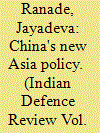

|
|
|
| 4 |
ID:
115194
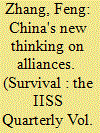

|
|
|
|
|
| Publication |
2012.
|
| Summary/Abstract |
In December 1949, Mao Zedong, paramount leader of the newly founded People's Republic of China, travelled to Moscow to negotiate a military alliance with the Soviet Union. Within barely two decades, however, not only had the alliance collapsed, but the two former allies had become bitter ideological and military adversaries. Strategic exigencies compelled the Chinese leadership to seek rapprochement with the United States, producing a quasi-alliance between the two erstwhile enemies after 1972. In January 1979, during his visit to Washington, Deng Xiaoping sought to nudge the United States toward developing a de facto, if informal, alliance with China in order to secure American support for China's impending invasion of Vietnam. During the last decade of the Cold War, China and the United States also maintained a degree of strategic cooperation against the Soviet Union.
|
|
|
|
|
|
|
|
|
|
|
|
|
|
|
|
| 5 |
ID:
132512
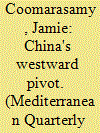

|
|
|
|
|
| Publication |
2014.
|
| Summary/Abstract |
The essay summarizes a recent reporting trip by the author to Tajikistan and Kyrgyzstan for the BBC, during which he examined the reasons for and observed the practical impact of China's growing influence in the former Soviet republics of Central Asia. The author provides a firsthand account of the scale and scope of Beijing's economic and, to a lesser extent, cultural investment in the region and of the way that local society is reacting to the changes. The essay also considers what the effects are for the traditional regional power, Russia, and looks at the Kremlin's response to the arrival of China as a major player in Central Asia.
|
|
|
|
|
|
|
|
|
|
|
|
|
|
|
|
| 6 |
ID:
091521
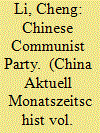

|
|
|
|
|
| Publication |
2009.
|
| Summary/Abstract |
This article explores two interrelated aspects of the new dynamics within the CCP leadership - the new elite groups and the new ground rules in Chinese politics. The first shows profound changes in the recruitment of the elite and the second aims to reveal the changingmechanisms of political control and the checks and balances of the Chinese political system.The article argues that the future of the CCP largely depends on two seemingly contradictory needs: how broad-based will the Party's recruitment of itsnew elites be on the one hand and how effective will the top leadership be in controlling this increasingly diverse political institution on the other.
|
|
|
|
|
|
|
|
|
|
|
|
|
|
|
|
| 7 |
ID:
147630
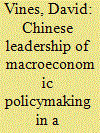

|
|
|
|
|
| Summary/Abstract |
This paper discusses the kind of leadership in global macroeconomic policymaking that China might provide. The paper describes a form of leadership, which I call ‘concerted unilateralism’, that enables countries to pursue their own objectives, in a way which they would not have been able to do if they were acting on their own, and enables them to achieve a higher level of welfare. I contrast such leadership this with a form of authoritarian leadership in which the leader imposes obligations on other countries which are to the disadvantage of those countries. I argue that China could provide leadership of the first kind, by making use of the G20 Mutual Assessment Process, or G20MAP. In the short term, China might do this by consolidating the ‘2-in-5’ action plan, which Australia instituted within the G20MAP when it was Australia was President of the G20. In the longer term, China might do this by ensuring that there is convergence between the G20MAP and China's own One-Belt-One-Road strategy for international engagement in trade and finance.
|
|
|
|
|
|
|
|
|
|
|
|
|
|
|
|
| 8 |
ID:
119138
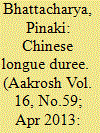

|
|
|
| 9 |
ID:
187203
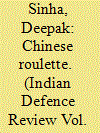

|
|
|
| 10 |
ID:
128481
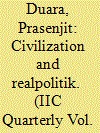

|
|
|
| 11 |
ID:
111301


|
|
|
| 12 |
ID:
089223
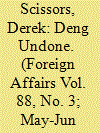

|
|
|
|
|
| Publication |
2009.
|
| Summary/Abstract |
The year 2008 marked the 30th anniversary of the beginning of market reforms in China -- and perhaps the third anniversary of their ending. Since the present Chinese leadership took power, market-oriented liberalization has been minor. And as such policies have wound down, they have been supplanted by renewed state intervention: price controls, the reversal of privatization, the rollback of measures encouraging competition, and new barriers to investment.
|
|
|
|
|
|
|
|
|
|
|
|
|
|
|
|
| 13 |
ID:
085907
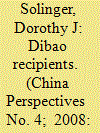

|
|
|
|
|
| Publication |
2008.
|
| Summary/Abstract |
After the Chinese leadership became cognizant of the negative social externalities of marketization-especially potential threats to its hallowed objectives of social stability and successful state enterprise reform-it initiated a novel welfare approach.
|
|
|
|
|
|
|
|
|
|
|
|
|
|
|
|
| 14 |
ID:
127118
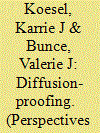

|
|
|
|
|
| Publication |
2013.
|
| Summary/Abstract |
Do authoritarian leaders take preemptive actions to deter their citizens from joining cross-national waves of popular mobilizations against authoritarian rulers? Are they more likely to engage in such behavior when these uprisings appear to be more threatening-in particular, when they take place in neighboring countries and in regimes that resemble their own? We provide answers to these questions by comparing the responses of the Russian and Chinese leadership to two such waves: the color revolutions and the Arab uprisings. We conclude that, despite differences in the ostensible threats posed by these two waves, they nonetheless prompted the leaders of both of these countries to introduce similar preemptive measures in order to "diffusion-proof" their rule from the color revolutions and the Arab upheavals. These findings have some important implications for our understanding of authoritarian politics and diffusion processes. One is to reinforce the emphasis in many recent studies on the strategic foundations of authoritarian resilience. That recognized, however, we would add that the authoritarian toolkit needs to be expanded to include policies that preempt international, as well as domestic threats. The other is to provide further confirmation, in this case derived from the behavior of authoritarian rulers, of how scholars have understood the drivers of cross-national diffusion. At the same time, however, we counsel students of diffusion to pay more attention to the role of resisters, as well as to adopters. In this sense, the geographical reach of diffusion is much broader than many analysts have recognized.
|
|
|
|
|
|
|
|
|
|
|
|
|
|
|
|
| 15 |
ID:
130978
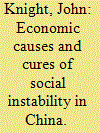

|
|
|
|
|
| Publication |
2014.
|
| Summary/Abstract |
China's leaders have often expressed concerns about social instability, viewed as a threat both to the political order and to continued rapid growth. Slower growth might, in turn, further undermine social stability. Using survey data, the present paper examines the economic determinants of social instability. Four main determinants are identified: past and expected growth of income, income inequality, economic insecurity and misgovernance. The paper then considers possible policies to reduce social instability, examining each of the determinants in turn.
|
|
|
|
|
|
|
|
|
|
|
|
|
|
|
|
| 16 |
ID:
126183
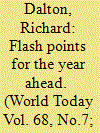

|
|
|
|
|
| Publication |
2012-13.
|
| Summary/Abstract |
Iran and the South China sea are top of the 2013 foreign policy agenda with rising tensions forcing them into the world spotlight.
|
|
|
|
|
|
|
|
|
|
|
|
|
|
|
|
| 17 |
ID:
138450
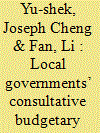

|
|
|
|
|
| Summary/Abstract |
The Chinese leadership is still reluctant to accept any reforms that are perceived to cause an erosion of the Communist Party of China’s monopoly of political power, although it is eager to improve governance, especially at the grassroots level. Participatory budgetary reforms as represented by the Wenling model are therefore perceived by some academics and local reformers as a channel through which breakthroughs in grassroots democracy in terms of public participation and government accountability can be achieved. Apparently this has gained some support from the top leadership—because some leaders are keen to reduce deficits and ensure budget transparency and accountability in local governments as well as at the top leadership—which now wants to combat corruption. Naturally, there is strong resistance because local governments are unwilling to limit their room for manoeuvre in terms of government expenditure and give up their control of extra-budgetary funds. While existing literature concentrates on the reform model and its rationale, this article offers a detailed empirical description of the actual reform processes at the local level. The Wenling consultative budgetary reforms were lauded and encouraged by Hu Jintao’s report to the 18th Party Congress on 8 November 2012. This offered the official support that the reformers needed, and provided the momentum they required to continue reforms and even promote them in other local governments. Of particular concern, however, is the intention of the Chinese leadership to incorporate this type of consultative mechanism into the framework of the Chinese People’s Political Consultative Conference; such a change would fall below the expectations of those who wish to secure breakthroughs in political participation.
|
|
|
|
|
|
|
|
|
|
|
|
|
|
|
|
| 18 |
ID:
038698
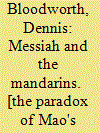

|
|
|
|
|
| Publication |
London, WeidenFeld and Nicolson, 1982.
|
| Description |
xvi, 331p.Hbk
|
| Standard Number |
0297780549
|
|
|
|
|
|
|
|
|
|
|
|
Copies: C:1/I:0,R:0,Q:0
Circulation
| Accession# | Call# | Current Location | Status | Policy | Location |
| 021627 | 923.151/BIO 021627 | Main | On Shelf | General | |
|
|
|
|
| 19 |
ID:
127603
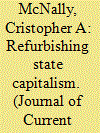

|
|
|
|
|
| Publication |
2013.
|
| Summary/Abstract |
This article provides an analysis of policy initiatives aimed at rebalancing China's political economy, especially those contained in the 12th Five Year Plan and other recent pronouncements. The objective is to generate a conceptual examination of these policy measures, thereby highlighting their basic intent and purpose. The analysis shows that the Chinese leadership intends to pursue policies that can centralize, standardize and regulate the political economy under continued state guidance. Due to the considerable political obstacles that Chinese policy-makers face in rebalancing the political economy, a more state-centric approach is seen as necessary. China is therefore pursuing a policy package of refurbishing state capitalism. While a degree of liberalization is likely to be undertaken, the major thrust is one of revamping, restructuring and, ultimately, strengthening state control and guidance over the political economy.
|
|
|
|
|
|
|
|
|
|
|
|
|
|
|
|
| 20 |
ID:
095871
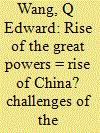

|
|
|
|
|
| Publication |
2010.
|
| Summary/Abstract |
Ever since it was first broadcasted in 2006, the Rise of the Great Powers, a popular Chinese TV mini-series of 12 episodes, has received great attention both at home and abroad. Some have suggested that the showing of this series marked a new orientation in China's foreign policy and a new perception of its position in the world. Using oral interviews and written works by the historians who masterminded the project, this article analyzes the view of the Chinese historian, and of current Chinese leadership, about the globalizing world today and China's position in and relation to it. Using the documentary as a starting point, it discusses the status quo of world-history study in China today and argues that though receptive to the incentive for globalizing history writing, historical scholarship in China remains grounded in a Eurocentric understanding of modern world history. China's recent economic expansion has paradoxically reinforced this tradition, as the country is bracing for its own world power status.
|
|
|
|
|
|
|
|
|
|
|
|
|
|
|
|
|
|
|
|
|